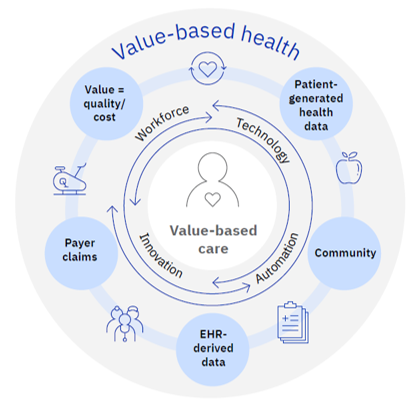Wellness
The 6 Steps to ‘Value-Based Health’
December 30, 2019 | Written by: Anil Jain, MD
Categorized: Wellness
Share this post:
 Over the last decade, healthcare has been moving away from fee-for-service toward value-based care. Providers, payers, life sciences organizations and other players in the healthcare ecosystem have been working to deliver care with better quality and experience, while reducing unnecessary costs.
Over the last decade, healthcare has been moving away from fee-for-service toward value-based care. Providers, payers, life sciences organizations and other players in the healthcare ecosystem have been working to deliver care with better quality and experience, while reducing unnecessary costs.
As “value-based care” matures, healthcare leaders recognize that efforts must extend beyond clinical environments to achieve these goals. It is this more comprehensive approach that is called “value-based health.”
What will it take to succeed with value-based health? The IBM Institute for Business Value recently interviewed 1,000 healthcare executives in six countries to study this topic. Analysis revealed six steps that can help payers and providers more effectively engage in value-based health:
- Consult the consumer. The study showed that while payers and providers currently collaborate most with each other, they agree that consumers will outpace other collaborators in the next three to five years. Patients are increasingly behaving more like consumers. In my opinion, further improvements in consumer engagement through advanced technologies may help payers and providers better predict specific health risks and deliver more appropriate interventions further enhancing the patient journey.
- Embrace empathetic automation. Technology can provide better options – both in operational and clinical areas – when the focus is on speed and accuracy in executing repetitive, rules-based tasks. Survey respondents overwhelmingly said technology should serve to strengthen, not replace, the human connection between providers and patients which is more than simply lifting and shifting automation from other industries into healthcare.
- Break down silos to build support for analytics. Healthcare organizations must balance the time spent collecting and integrating data to derive useful insights. While C-suite respondents agree that analytics can help payers and providers improve quality and reduce cost, Chief Clinical Officers were most likely to cite increased administrative work as a drawback.
- Focus on time-to-value. What is the speed in which healthcare organizations can adopt change? Researchers asked about top priorities and found that organizations that consider themselves “mature” in their value-based-health journey are investing heavily in Artificial Intelligence (AI), though payers and providers have slightly different priorities in applying the technology.
- Overcome innovation barriers. Payer and provider respondents agree that the most daunting challenge is the lack of meaningful interoperability, which is the ability to securely and seamlessly exchange electronic health information across the healthcare ecosystem.
- Optimize the value equation (Value = Quality/Cost). The study shows agreement among payers and providers about the definition of value but differ on their approach. Payers are more likely to say they focus on lowering costs in a manner that does not negatively impact quality (35% vs. 30% of providers), while providers are more likely to say they focus on improving quality, and the cost savings will come (31% vs. 27% of payers).
The study shows that value-based care has had some success in achieving better quality and outcomes with lower cost; by building upon that foundation, value-based health has the potential to further transform the healthcare industry, as long as payers and providers are prepared for this evolution.
This journey will require broader collaboration and engagement with consumers, effectively leveraging insights from existing data and others through meaningful interoperability and finally by more efficiently and consistently focusing on the “value” equation.
______________________________________
Related:
- Blog: Making the move to value-based health
- IBV Study: The emergence of value-based health

Vice President and Chief Health Information Officer, IBM
Making the workplace safe for employees living with HIV
The recent promising news about Covid-19 vaccines is in sharp contrast to the absence of a vaccine for HIV, despite decades of research. Unlike Covid-19 with a single viral isolate that shows minimal diversity, HIV circulates in a wide range of strains that so far have proven impervious to a single vaccine. Fortunately, more people […]
Call for Code for Racial Justice Needs You: Join the Movement
IBM has never avoided taking on big challenges. At IBM, we are privileged to drive impact at scale. We take on challenges that transform our clients, impact people’s lives and innovate for future generations as we strive to effect systematic societal change. Over the course of our 109-year history, the evidence has become clear that […]
A New Wave: Transforming Our Understanding of Ocean Health
Humans have been plying the seas throughout history. But it wasn’t until the late 19th century that we began to truly study the ocean itself. An expedition in 1872 to 1876, by the Challenger, a converted Royal Navy gunship, traveled nearly 70,000 nautical miles and catalogued over 4,000 previously unknown species, building the foundations for modern […]


